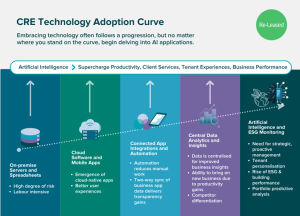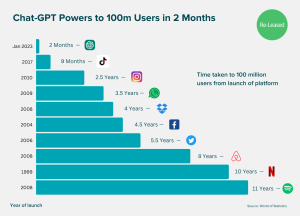- Published date:
- 18 October 2023
AI in Commercial Real Estate: The Unstoppable Future
By Sam Caulton,
CFO at Re- Leased
Every so often, the commercial real estate sector witnesses a paradigm shift. In the past, this shift was driven by data and digitisation. Today, it's marked by the undeniable surge of Artificial Intelligence (AI). As Reid Hoffman (founder of LinkedIn) describes it, AI represents technology's “crescendo moment”. While the tech landscape is awash with buzzwords, AI isn’t merely another fleeting trend impacting other industries; it stands as possibly the most significant technological advancement in the last 100 years and likely within our lifetime. For modern commercial real estate businesses, AI is swiftly becoming foundational—a game-changer that promises not just evolution but revolution.
If you recall our industry's digitisation journey, we began by moving away from on-premise servers to embrace the cloud benefits and automation, then progressed to uncovering the power of data. Before we knew it, data-driven insights were dictating how commercial spaces were bought, sold, and managed.
Now, the baton has been passed to AI. It's no longer just about having sophisticated databases; it's about smart, predictive systems that anticipate market movements, streamline operations, and deliver unmatched value to stakeholders.
The future of commercial real estate is undeniably intertwined with AI. From chatbots guiding potential clients through property portfolios to intelligent algorithms that predict property value appreciation, the applications are vast and transformative. The commercial real estate sector is particularly ripe for such innovations. Imagine a leasing process where AI-driven tools evaluate tenant financials in real-time, predicting their long-term viability, or management systems that pre-emptively address building maintenance before issues escalate.
Furthermore, efficiency is no longer just a buzzword — it's the backbone of competitive advantage. In commercial real estate, where margins matter, the knock-on effects of missed opportunities are long, and tenant experiences are key to drive high occupancy, AI offers an unparalleled edge. With AI, repetitive tasks like maintenance requests and tenant communication can bypass the human intermediary while retaining the element of empathy. Think of a request coming in, AI analyses the request, replies via email matched to their tone of voice, logs a maintenance task, evaluates the right trade required and reaches out. Or tasks that once took days, such as evaluating vast portfolios or analysing complex tenant data, now take mere moments. The result? Enhanced decision-making, optimised asset management, and a profound transformation in how we approach real estate strategy.
 CRE Technology Adoption Curve
The developing world telecommunication leap is a fitting analogy here. In the same way many developing regions skipped the technology of landlines to embrace mobile technology, commercial real estate businesses must now leapfrog past outdated methodologies and straight into the AI era. It’s not just about keeping up with the times; it’s about pioneering a new age of real estate management and transactions.
This isn't about reinventing the wheel. It's about optimising it for a landscape that's evolving at breakneck speed. AI's potential in our sector is boundless, touching every facet from property valuation to customer relationship management. As commercial real estate professionals, we must recognise and harness this potential.
CRE Technology Adoption Curve
The developing world telecommunication leap is a fitting analogy here. In the same way many developing regions skipped the technology of landlines to embrace mobile technology, commercial real estate businesses must now leapfrog past outdated methodologies and straight into the AI era. It’s not just about keeping up with the times; it’s about pioneering a new age of real estate management and transactions.
This isn't about reinventing the wheel. It's about optimising it for a landscape that's evolving at breakneck speed. AI's potential in our sector is boundless, touching every facet from property valuation to customer relationship management. As commercial real estate professionals, we must recognise and harness this potential.
 Time to reach 100 million users from launch of platform
The rapid adoption of Chat-GPT highlights the eagerness to embrace AI, World of Statistics
Here are further examples of how AI is being explored:
Time to reach 100 million users from launch of platform
The rapid adoption of Chat-GPT highlights the eagerness to embrace AI, World of Statistics
Here are further examples of how AI is being explored:
 CRE Technology Adoption Curve
The developing world telecommunication leap is a fitting analogy here. In the same way many developing regions skipped the technology of landlines to embrace mobile technology, commercial real estate businesses must now leapfrog past outdated methodologies and straight into the AI era. It’s not just about keeping up with the times; it’s about pioneering a new age of real estate management and transactions.
This isn't about reinventing the wheel. It's about optimising it for a landscape that's evolving at breakneck speed. AI's potential in our sector is boundless, touching every facet from property valuation to customer relationship management. As commercial real estate professionals, we must recognise and harness this potential.
CRE Technology Adoption Curve
The developing world telecommunication leap is a fitting analogy here. In the same way many developing regions skipped the technology of landlines to embrace mobile technology, commercial real estate businesses must now leapfrog past outdated methodologies and straight into the AI era. It’s not just about keeping up with the times; it’s about pioneering a new age of real estate management and transactions.
This isn't about reinventing the wheel. It's about optimising it for a landscape that's evolving at breakneck speed. AI's potential in our sector is boundless, touching every facet from property valuation to customer relationship management. As commercial real estate professionals, we must recognise and harness this potential.
 Time to reach 100 million users from launch of platform
The rapid adoption of Chat-GPT highlights the eagerness to embrace AI, World of Statistics
Here are further examples of how AI is being explored:
Time to reach 100 million users from launch of platform
The rapid adoption of Chat-GPT highlights the eagerness to embrace AI, World of Statistics
Here are further examples of how AI is being explored:
- Elevate insights through data: The CRE sector, abundant with data, can now harness AI to gain actionable insights on an unprecedented scale. Machine learning algorithms can sift through historical data to predict market trends, optimise pricing strategies, and even anticipate tenant behaviours, arming decision-makers with tools to be proactive.
- Enhanced tenant experience: Experience is currency in today's market. AI's prowess shines in this domain, from chatbots fielding tenant queries in real-time to predictive maintenance addressing potential issues. The result? Improved tenant relations and a boost in retention rates.
- Do more with less resource and streamlined operations: Efficiency is paramount in CRE. AI brings to the table tools that can automate routine tasks, offer portfolio management insights, and even influence negotiation processes, ensuring operations are not just smooth but also smart.
- Sustainable CRE management: As sustainability takes centre stage globally, AI chips in with energy management, optimising building systems in real-time. This not only reduces the carbon footprint but also cascades into notable cost savings.
- Minimise risk and bolster security: Achieve complete visibility throughout your business and ensure no significant events go unnoticed. Improve data accuracy, eliminate human mistakes, and concurrently decrease compliance risks and bolster data protection.
Share article
